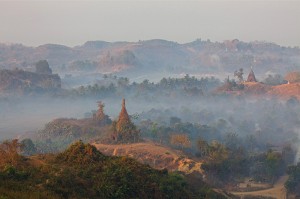Myanmar: The Gold Rush in a gyia sarong
As of today, Myanmar is officially the place to be, especially if you’re a European investor with big dreams and a bob or two to spare.
The European Union (EU) has lifted all sanctions on Myanmar, leaving only an arms embargo in place. This is pretty good going for a country that was so much a pariah its uniformed leaders were barred from setting foot on EU soil and whose membership of the Association of Southeast Asian Nations chilled the EU’s relations with that trade bloc for nearly a decade from 1997.
Now, Europe, like everyone else, is in a hurry to get into Myanmar and get to work. Doing what exactly? Making money, that’s what. Nothing wrong with the philosophy. It’s the ‘Gold Rush in a gyia sarong’, the long garment worn by both men and women in Burma.
Everyone’s in a hurry – web entrepreneurs, tour operators, metals companies and gems dealers and big European jewellery houses.
Myanmar is blessed with so much – 90 per cent of the world’s rubies come from here and they are considered real gems (to coin a phrase) being brilliantly hued and exceedingly pure. Rare pigeon’s blood rubies and blue sapphires come from the ‘Valley of Rubies’, north of the fabled city of Mandalay. Myanmar also produces jade and pearls.
To give it credit, Myanmar’s government appears willing, even eager to play along. They are implementing measures to ease restrictions on investment, opening up to the global financial system, the press is free enough now and political reform is underway.
They’re talking the talk – and walking the walk. They are now accompanied on the journey by a host of Europeans (not to mention Americans, Canadians, Australians, Indians and others).
Of course, there’s a problem still with human rights issues but for now, Myanmar’s ‘The Lady’, Aung San Suu Kyi, insists these should be kept separate from economic issues. She told the BBC that she didn’t want to continue to rely on “external factors” to bring about change in her country. Many are nodding ‘yes’ to that.
It suits almost everyone to do so.


